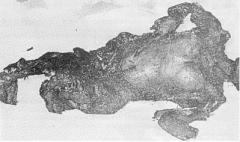
'Self-Inflicted - An exposure of the H-Blocks Issue' by Peter Robinson (1981)[Key_Events] Key_Issues] [Conflict_Background] Material is added to this site on a regular basis - information on this page may change
The following pamphlet has been contributed by permission of the author Peter Robinson. The views expressed in this book do not necessarily reflect the views of the members of the CAIN Project. The CAIN Project would welcome other material which meets our guidelines for contributions.
Originally published in Belfast by the Democratic Unionist Party (1981)
This document is copyright Peter Robinson and is included
on the CAIN site by permission of the author. You may not edit, adapt,
or redistribute changed versions of this for other than your personal use
without the express written permission of the author. Redistribution
for commercial purposes is not permitted.
296 Albertbridge Road Dear Reader, One could hardly be unaware of the situation at Her Majestys Maze Prison in Northern Ireland where 7 sentenced Republican Prisoners are presently on hunger strike and several hundred others are on a campaign called the "Dirty" protest. While the fact that this is happening may be known to you, the circumstances may not be so clear. In this booklet I have attempted to lay before the reader an account of these circumstances in perspective and demonstrate that the conditions under which the protestors exist, are self-imposed and self-inflicted. I referred to an account "in perspective" because when considering this whole situation it is necessary to do so against the backcloth of over 2,000 people who have been murdered and more than 20,000 who have been maimed and mutilated during this present I.R.A. campaign. Perhaps, to help gain the right priority, the following lines could be read. They were penned by a young mother left a widow by the action of one of the "Dirty" protestors in the H-Blocks. These verses and an accompanying letter were sent anonymously to me by this sorrowing woman who simply signed herself "One who has suffered".
I trust that you can take the time to read this booklet and be able to feel an affinity with the Ulster Community who have suffered for over a decade at the hands of terrorists. If you do, then perhaps the fallen have not died in vain and we, though often misunderstood and at times forgotten will not stand alone. Yours sincerely.
ALDERMAN PETER D. ROBINSON, M.P.
SELF-INFLICTED AN EXPOSURE OF THE H-BLOCKS ISSUE by Peter Robinson, M.P.
Cover photograph: The inside of an H-Block cell with the walls smeared by the inmate with his excrement.
THE KILLERS VICTIMS Only a few days earlier the same assassin who gunned Jeffrey Agate down callously murdered a young Roman Catholic R.U.C. Detective Constable. Patrick Liam McNaulty, a married man with a young family, was off-duty when the I.R.A. man pumped a hail of bullets through the window of his car which he was leaving into a garage near Londonderry to be serviced. The 30 year old policeman was killed instantly behind the wheel of his vehicle. The Roman Catholic Provisional I.R.A. proudly and publicly accepted responsibility for these killings, of which there have been over 2000 during the present campaign. 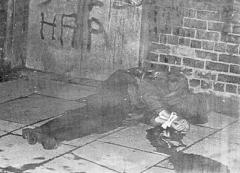 One of the two thousand victims. THE VICTIMS KILLER THE PRISON AND ITS ACCOMMODATION THE H-BLOCKS 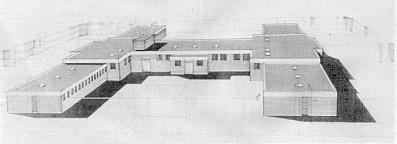 An architect's drawing of an H-Block. THE COMPOUNDS A SPECIAL TYPE OF CRIME? Innocent civilians, women, elderly and handicapped persons, children and even babies are numbered amongst their victims. If the I.R.A.s crimes are in a special category and deserve different treatment then clearly it should not be a more lenient or relaxed existence that should be the alternative. After all it does take a special type of "hero" to carry out a fire bomb attack on an hotel full of people. Many would argue, and I among them, that if the British Government, being directly responsible for the Government of Northern Ireland (which is, and wishes to remain an integral part of the United Kingdom), had the moral resolve they would introduce tougher sentences, more befitting the crimes committed. PRISONERS OF WAR? 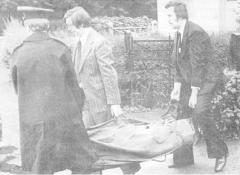 Another victim of a doorstep killing. The terrorist is in every respect a murderer and not a soldier. By definition his cause is that of a tiny minority determined by violence to over-ride the wishes of the majority. His cause is not the cause of the people; it is a cause contrary to the people. Terrorists in Northern Ireland are not caught and imprisoned without trial as in a "conventional war". Instead they are brought before an open court, tried and if found guilty, sentenced and duly imprisoned. Society properly deals with them like the low and common criminals they are.
MURDER MURDER MURDER MURDER This is what the bombers did To a human being MURDER MURDER MURDER MURDER MURDER MURDER The action of a special type of "hero" - the remains of one of the twelve people killed at the La-Mon House Hotel when a bomb exploded without warning.
THE OPEN COURT Nothing could be further from the truth and an examination of the actual facts exposes such an allegation as totally unsubstantiated in law or fact. The due process of the law is vigorously observed. Cautions and notices of the suspects rights are correctly given and strict procedural rules must be followed by the Police to the extent that virtually every movement of a prisoner in custody must be recorded, from eating a biscuit to the exercise of his bodily functions. The whole area of law relating to defendants statements is entirely geared towards the defendant. Prior to the trial, the defendant has only to raise a prima facie case that his statement was not made voluntarily and the Prosecution are then faced with the daunting task of clearing difficult legal hurdles. They must prove, beyond reasonable doubt, that the statement was made voluntarily, and not induced by torture, inhuman or degrading treatment. If the Prosecution fail to overcome these obstacles then the defendant will walk free from the Court. It is patently obvious that the legal system is thoroughly designed to guard against wrongful and unjust convictions and its success is apparent by the relative absence of appeals against conviction. It must therefore be concluded that the overriding aims of justice, due process and fairness have been consistently regarded and adhered to, contrary to the distorted and completely ill-founded claims of Republican propagandists. THE I.R.A. PRISONERS NAUSEATING CAMPAIGN
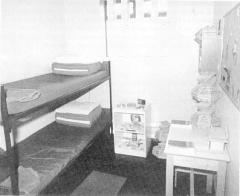 The accommodation offered to the H-Block inmates (see front cover for the way the Republican prisoner on the Dirty protest treats his cell).
In pursuit of their demand for privileged treatment about 350 of the H-Block prisoners are refusing to conform to prison regulations. They refuse to wear the prison clothes offered to them; instead, they choose of their own free will to wrap themselves in their prison blankets. The campaign is called the Dirty protest and whoever so named it was a master of under-statement. If cleanliness is next to godliness then to whom are these men close? The prisoners refuse to work or wash; to shave or cut their hair; they refuse to use the toilets available preferring instead to smear their own excreta across walls and ceilings; they deliberately destroy all the furniture in their cells and smash the cell windows; they decline to exercise or make use of the library facilities choosing instead to rip up Bibles and religious magazines. Having done all this they then blame and condemn the authorities for the conditions under which they are imprisoned. Is it surprising then that sympathy is not poured lavishly upon such individuals especially when it is considered that 100 of these prisoners are serving sentences for murder or attempted murder? Yet through propaganda spewed out on an ill-informed public across the world the impression has often been created that there is some justice in their cause or substance to their claim proof positive that the unanswered lie will become the truth.
FAST TO DEATH
GOVERNMENT CONCESSIONS 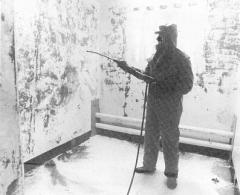 A member of the Prison Staff cleaning the cell of a "dirty protestor". The British Government also erred when, in the face of the present hunger strike blackmail, they responded by offering to allow all prisoners to wear civilian type clothing. This comes close to one of the prisoners demands but instead of encouraging co-operation from the protesters it has resulted in their gaining the scent of victory, causing them to hold out for the complete package. No doubt if their present terms were met further demands would follow leading to a total amnesty for terrorist prisoners. History shows that militant Republicanism can never be conciliated or accommodated. WITH WHOM IS YOUR SYMPATHY? 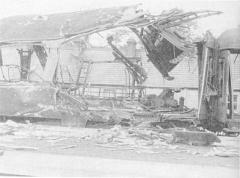 The mangled railway carriage in which a female passenger was killed by a no warning bomb. If you hear through the news media of the suffering of the hunger strikers think first of the widows, the orphans and the families of their victims. Think also of the thousands of maimed and mutilated citizens of Northern Ireland left to live out their remaining years with the scars and deformities resulting from the actions of the hunger strikers and their colleagues still at large. Think of the memory of the 2000 dead and tell me should the self-inflicted action of these murderers be allowed to blackmail Government and Society alike, to give them privileged treatment? The answer comes back from near and far NO NEVER.
|
CAIN
contains information and source material on the conflict
and politics in Northern Ireland. CAIN is based within Ulster University. |
|
|
|||
|
Last modified :
|
||
|
| ||

